#everything is getting denied
Text
Why is insurance and rent kicking my ass. It was never this bad last year.
#personal#everything is getting denied#help#not only that my debit card was stolen like a week ago and had to get things changed#i hate this fuckin family
8 notes
·
View notes
Text

They have since left four premature babies to decompose on their beds. They have since kidnapped, stripped, tortured civilians and tried to frame them as Hamas fighters for their propaganda. They have since shot people at refugee camps execution style. They have since targeted academics and poets and directors. They have since killed 86 journalists. Still no ceasefire.
psa: i know that many of us did NOT doubt this for a second, neither did i. this is targeted at the people who educated themselves for the first time about this genocide and discovered the absolute horrific things that Israel is capable of doing to Palestinians, with the unwavering support of its allies.
#i rem clearly that video of the first hospital that was bombed#how israel first denied it and said that it was a failed hamas rocket#then it said it attacked the hospital because hamas was hiding in there#and i rem thinking that this would get every world leader outraged#that they would do everything to stop this genocide#that was too many weeks ago#nothing has changed#this should terrify us all#this could have been us in that hospital#in that house in that refugee camp in that ambulance in that street#nowhere is safe in Palestine#nowhere#free palestine#palestine#free gaza#gaza
16K notes
·
View notes
Text
does anyone realize how crazy it is to have the actor of a mostly headcanoned queer ship say the fans were never crazy and they were right all along after 10+ years of everyone just absolutely going nuts over the said queerbaited ship
#supernatural#dean winchester#spn#destiel#castiel#deancas#misha collins#im 20 i have been Experiencing supernatural and johnlock since i was 12 and merthur since wayy before that i have fought Wars#this is crazy#i love u hannibal i love u 911 (if u make eddie gay)#for the love of god by 'mostly headcanoned' i dont mean that it was never intentional#i am aware that they put the subtext in on purpose#they knew what they were doing#but my focus here is on the actor actually saying it because like#if its not mostly headcanoned then y was the entire cast denying it for years AND YEARS#like do yall not remember what jared and jenesn used to say#there have been many many many instances where the cast has made us feel crazy/stupid for saying anything abt destiel#im just saying TO ME its crazy that actors and creators talk so openly about these things now !!! again i was raised on merlin and sherlock#ok also im confused on the queerbaiting part#everyones saying its queer coding and not queer baiting but cant they be true at the same time ?#im not being dumb on purpose i swear im just confused#like yes dean is very much bi coded and their relationship is queer coded but if the creators deny everything#and we only get a last minute confession after 11 years#that doesnt count as queer baiting ?#someone smart explain this to me 🙏
3K notes
·
View notes
Text
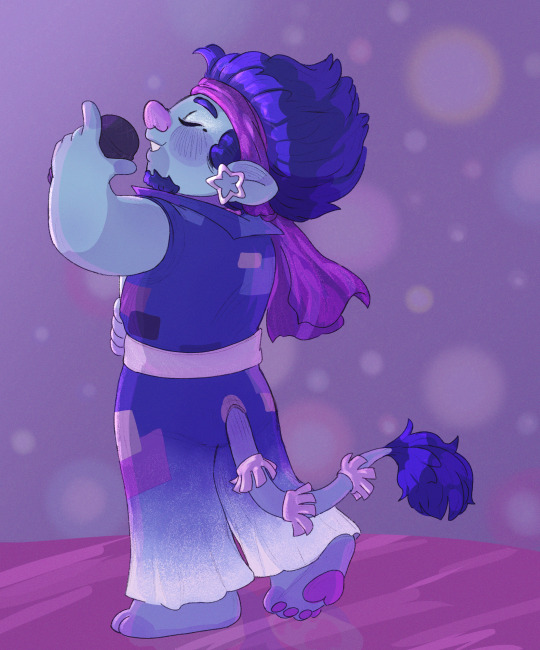
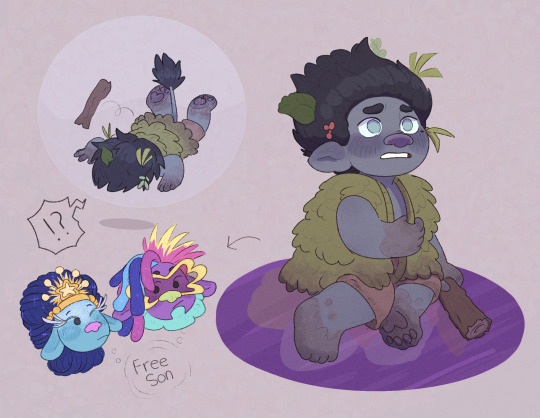
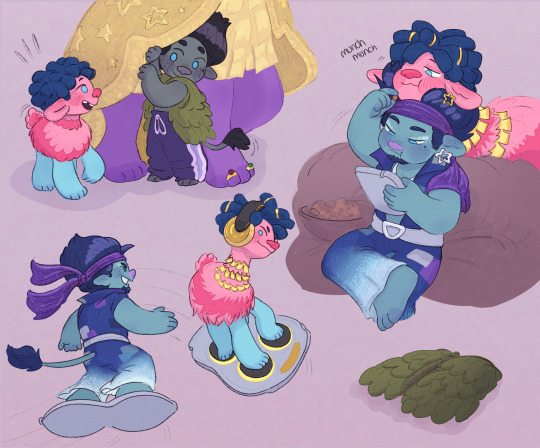
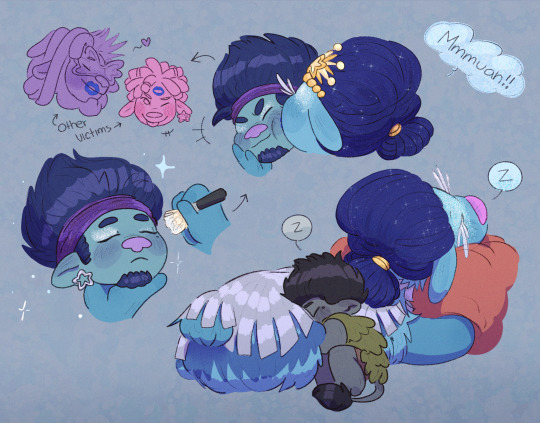
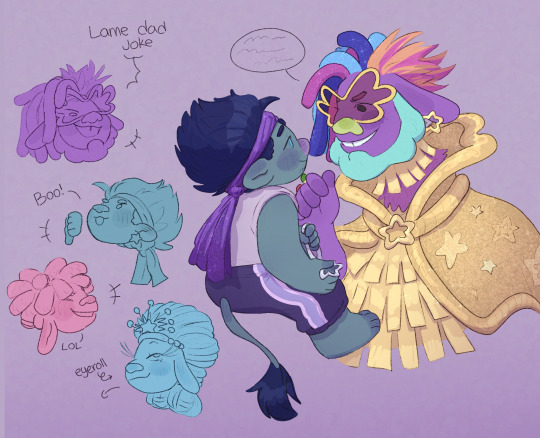
Funk branch au
Au and branch design by @bbc-trolls
#dreamworks trolls#trolls#trolls au#trolls branch#trolls prince d#trolls queen essence#trolls king quincy#thank you bbc-trolls!! for both making this au! and for giving permission for fanart <3#oooghghg love this au#never knew I needed something so much#Funk family! your perfect! your everything#forgive me my queen! had a hard time drawing you#funk trolls are a bit of a struggle lol#‘branch gets adopted by another tribe’ you will always be famous#yeh funk fam and even funk trolls as a whole would be a good fit for branch#their advanced tech. how accepting/understanding they are (cue twt talk about differences) and did you see them get ready to battle!#the more I think abt this au the more I love it#the more I think about funk trolls the more I LOVE THEM<3#they're so cool#this took a little long to make. kept adding more and more lol#in case your wondering Quincy is giving a talk about how him being different to both pop and funk is okay and should be cherished#like that talk in twt about how the strings/troll genres are different and to not deny it cause it's an important.#silk sonic on repeat making this! edit: forgot to say thanks to lonedawn for mentioning the album on bbc’s og post! you are so right <3#also listened to other funky songs#need more funk music!! it reaches as special part of the soul#can not recommend 'atomic dog world tour remix' enough. it's so good. prince d's verse at 1:27 fav#trolls fanart#excuse the messiness#funk branch au#my art <3
2K notes
·
View notes
Text

Simple observation I made from reading these comics. DC, stop making their dad an asshole and make him hug them more.
Also, the hugs in these comics:

Tim's hug is not in Red Robin but it's during the run and when Bruce comes back in time.


Cass' hug is weird because they're suicidal freaks who think fighting is therapy. They fought while being drugged, and blew up a brigde. It makes sense for them only.


Jason's first hug (Outlaws) is after he tries to apologize for his crimes and Bruce refuses to let him to do it, because his boy is innocent for him 🥺 (and then, they fucked it up with Ethiopia because they cannot let them have nice things 🙄). The second one (Red Hood & Arsenal) is started by Jason, who is just very happy to see that Bruce is alive, even if he has lost his memory.
#cassandra cain#jason todd#tim drake#red hood#red robin#batgirl#dc comics#my ramblings#cass and tim are everything but subtle about how much they want hugs from Bruce#Jason is trying very hard to deny it but the moment he can have one he runs for it#I have barely started outlaws 2016 before being distracted so I don’t know if it follows the same theme#I'm getting worried about Bruce and Jason's relationship from panels I saw around like pls wtf are they making Bruce say or do again 😮💨#no he is not classicist DC controls your writers I swear#me 🔪 Dc#yeah cass and bruce hug is weird they are freaks#my vision for Jason is that he doesn't ask for hugs but the moment Bruce is offering he is throwing his siblings out of the way#the guy was so possessive of his dad he got mad when he learnt he got more kids he is against sharing the hugs
831 notes
·
View notes
Text
That Good Ol' Fenton Charm
Hmmmm
Single dad Danny (to deaged Ellie and Dan) meets his neighbor Selina Kyle after one of her cats get into their apartment and he finds his kids playing with it.
Cue meet cute where Selina at first is just flirting like always but Danny charms her (aka being a bit dense but somehow adorkable, its charming)
#danny phantom#danny fenton#crossover#dp x dc#blue rambles#danny phantom dc#writing ideas#random idea#dpxdc#selina kyle#dannyxselina#whats this ship name again?#danielle fenton#dan fenton#danielle phantom#dan phantom#Selina flirts but starts to fall for Danny#Danny is adorkable with Selina and the kids#Selina and Bruce broke up again so shes flirting#or isnt there a storyline where Selina and Bruce almost get married but dont?#maybe after that timeline?#Ellie finds Selina so cool btw.#she wants to learn EVERYTHING from Selina#Dan finds her awesome and he gets to pet all the cats she has in her place#i can see Selina denying actually having feelings for Danny for a bit#maybe even trying not to fall so he and the kids arent harmed if her night time activities catch up with her#but then of course the Fenton's have their own secrets Selina#some ghostly ones
782 notes
·
View notes
Text



pygmalion and galatea for aroace people

you should tell your friends what I look like, riz gukgak.
#fantasy high#fantasy high sophomore year#fhsy#riz gukgak#baron from the baronies#fh class quangle#class swap babeyy! bard!riz that's whats goin on!#I really need tags for these now I think lmao#ask to tag#I feel like this should be tagged something. but I dont know what#in my brain after the initial kidnapping class swap baron's thing is every time riz keeps his story abt them up in front of his friends#they get a little bit closer. they send him pictures of where they supposedly are n stuff#theres a scene in my brain only of kristen and riz on top of the van and kristen is like everything kinda sucks rn can u tell me abt baron#cause what you guys have is so nice and beautiful. and riz almost doesn't but he ultimately can't deny kristen a little peace#lmao I feel like dipping into baron stuff with the class swap is like showing my whole ass online again I just. I'm a#horror person before all else... I cant stop myself. canon baron is Great and Cool but that is kind of the thing. for a horror thing theyre#Too Cool. I think cool is kind of the neutralizer of scary. when a monster is a certain amount of cool it overrides the scary#and now u just have a Cool Monster#its so fucked for bard!riz this year bc he doesn't have an office (he's mooching off the school wifi from the AV club room lol)#so there's no buffer between adventure and home life. so baron just shows up in the strongtower apartment lmao#sophomore year bard!riz looks like a slasher protag so I just leaned into it I guess. he gets a mr. x if mr. x is made up by leon kennedy#well. its worse actually. they can show up where he is at any moment theyve proven this. but they dont#they choose to punish him slowly as he lies to his friends instead. baron is mr. x if mr. x is made up by leon and also a bitch#I think its gonna pop up if class swap baron ever speaks in a comic I do but their voice comes from like. inside their hollow face#it sounds like it's a lot deeper in there than that skull should be#tbh what I have rn is kinda like a bag of loose pieces that Can fit together into something great but I dont have the energy to#really sit down with them yet lol. Im doing this inbetween other things#it comes or it doesn't! it's fine. funny how today's bad comic day also. I wont say this is for bad comic day bc all my comics are#flawless and beautiful and perfect and awesome and beautiful and the best#but u should. if u havent drawn a comic today or at all ever u should draw a comic
277 notes
·
View notes
Photo

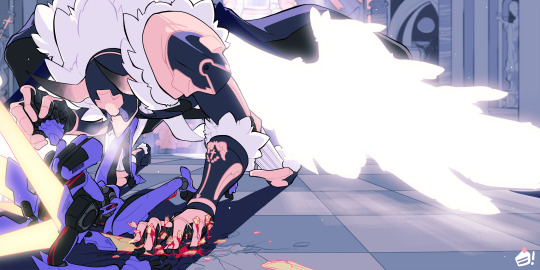
in the tomb of saint gabriel
(may your woes be many)
#ultrakill#v1#gabriel#ummm....hi.#couldn't stop thinking about a fallen angel gabe boss fight ok!!!#his tomb is fashioned after his role in the annunciation#with a sculpture that depicts gabriel in his human guise as its centerpiece#importantly....this is not his true face at all but it looms over his casket#a perfect image that is perpetuated to both deny his fall and to shame him at the same time#in the fight itself he can no longer fly or teleport nor can he conjure any weapons#he's just fast and brutal and definitely goes after v1's wings#he's lost in his mental and physical anguish doing everything he can to tear v1 apart#REALLY leaning into when he said 'fight me like an animal' ig....#like i imagine him a lot like a bull....even using his horns maybe.....#doodle tag#UHUH i might do some more sketches but nothing so involved !!!#i can't see straight after staring at a billion cathedrals#ALSO i'll get back to asks soon thank u for ur patience!!#rise and fall au
2K notes
·
View notes
Text
what I wouldn't pay to see mac punch holes into the walls of the suburbs house as he's tasked with fixing something he doesn't know how to fix and meanwhile the only constant in his mind is how much he misses dennis
#iasip#it's always sunny in philadelphia#always sunny#mac mcdonald#do you vibe do you understand what im saying#those holes covering the walls of the living room speak to me deeply because he looks so calm in the episode. in fact it's dennis that -#gets the freakouts. but the wall is covered of mac's ones. we just don't see them. he didn't go to school for it.#and so they're hiding all the trash in a room and all the mac n cheese in the closet to not deal with it. and mac's still kicking the#monkey under the counter to not deal with it. hide and deny. he Doesn't know how to fix things. he wants to. he tries. he can't#no one notices the fire starting in his room until you open the door#i feel guilty all the time for my thoughts and urges#everything i do i do for you#to the point of complete self destruction that drags BOTH down#analysis
544 notes
·
View notes
Text
me stoically navigating my way through drama bc bigger things are ahead and it’s not my fault people are dumb

#kissed a guy at a kickback and thought we caught a vibe only to find out he just wants to fuck me. next#friend’s bf of 7 years drunkenly hit on me at the same kickback (I was not ok w this). they ended up beefing over me. he denied everything.#do I want to be involved in this? no. and so I simply ignore it and keep it pushing#and the guy I kissed is cancelled. like he is dead to me. so that’s also taken care of#it’s back to studying full-time for the mcat#going to the gym/taking walks daily#volunteering at the refugee center + clinic#getting published in orgo research papers#and trying to snag the opportunity to shadow doctors at a massive cancer research center. like I’d kill for it#december was such a mess but I’ve finally made peace w the fact that most of the stuff that happened I couldn’t prevent#but I’ve mourned it enough !! whatever drama comes out of it I’ll handle just fine#i literally want to be a multitasking academic weapon everyone is intimidated of this year#i am not letting something as puny as a dumb man (both of them btw) stop me. goodbye#also everyone involved is older than me (they’re both 23) but it all just feels like such high school behavior#this is not a euphoria episode like I’m literally just not entertaining any of this#had to get this off my chest. i feel better#p
187 notes
·
View notes
Text

I can't get The Book of Bill atm and i can only feed off of your scraps, Tumblr
Is this accurate
#my art#gravity falls#bill cipher#book of bill#by the time i can get my grubby paws on this thing everything will already be cracked wide open is2g#universe denying me my fun smh#ive also been thinking about making a playlist for Bill just for fun#not on spotify though i dont use that. i cant afford it anyways lol#if you want to send me song requests feel free!#just no patd or fall out boy or whatever. please. i beg you#im probably gonna crawl back into my little hole underground again lmao
64 notes
·
View notes
Text
An analysis of Alhaitham's egoism in relation to Kaveh
(Update: The essay this is taken from is now uploaded! It can be accessed here and here as as a pdf <3)
Max Stirner's anarchist egoism is speculated to be the basis of Alhaitham's personal egoism, therefore I will be drawing upon Stirner's 'The Unique and Its Property' for this analysis.
Property and power are key principles within this philosophy. The egoist recognises himself as an individual, separate from the general collective of “humanity”, in which concepts such as freedom and property are governed to and over the people, for then the individual is not considered as such, rather they are a part of “humanity”, rather than a whole individual (Stirner, 170). This thinking is demonstrated within Alhaitham’s Story Quest, where he dismantles Siraj’s Hivemind by targeting individuals that compromised the Hive and reminding them of their own beliefs and preferences – the individual in themselves is a whole, and is not a “part” of a system (Stirner, 170).
In this, the egoist governs himself by what he owns and what he wants to own: “ownness is my whole essence and existence, it is myself. I am free from what I am rid of, owner of what I have in my power, what I control. I am at all times and under every circumstance my own”(Stirner, 106). This relates to the concept of freedom, which, for an egoist exists according to having the power to be free of something, for example, being freed of hunger, thirst, or societal expectations (Stirner, 105). This is reflected within Alhaitham’s description: “He lives free – free from the searching eyes of ordinary people,” but also extends to the power to own.
As power is considered something which the egoist owns, property then becomes something which the egoist exerts power over, and in this, can property be made use of by the egoist – all the while, the property remains an independent vessel (Stirner, 162). This is seen within Alhaitham’s view on his vision, in that it is “no more than a useful tool”, as it can be used to serve his own needs, and that since it in his possession, he has obtained it with his own power, it makes no difference to check on it as he continues to retain that power.
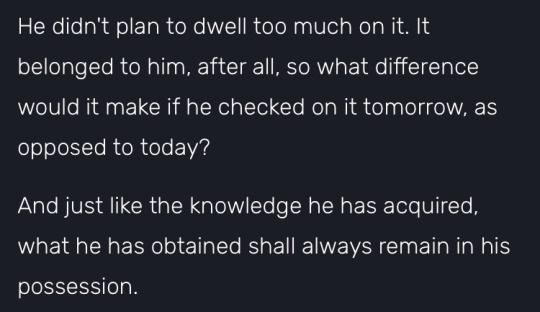
In this sense then, Alhaitham has constructed his life around this form of egoism, in that anything he wants, he has, such as his job as the Scribe, his house, the interests he pursues, the people he enjoys. In order to maintain this way of life, he will deal with, or be rid of, anything he deems as "harmful".

With this, the egoist seeks satisfaction in themselves through the satisfaction of another. Ownership, in relation to another person, can become love, which like all things the egoist has power over, is ultimately theirs – as in their love for a person (Stirner, 187), which is given willingly by the egoist, for loving a person is done for the satisfaction that love brings: “But I love them with the awareness of egoism; I love them because love makes me happy, I love because love is natural to me, it pleases me,” (186).
In loving another comes sacrifice, which the egoist can give into without compromising himself, as he himself sets the “purchase price of [his love]” (187) according to the happiness attributed to the loved one, as in return, the egoist shall also receive happiness (186). To enjoy someone, in an egoist fashion, is to be able to sacrifice all possessions and ownerships without foregoing the sense of an individual, of “ownness”, as the egoist would then lose his objectivity:
“I can deny myself countless things to heighten his pleasure, and I can risk for him what would be dearest to me without him, my life, my welfare, my freedom. Indeed, it forms my pleasure and happiness to feast on his pleasure and happiness. But me, myself I do not sacrifice to him, but rather remain an egoist and—enjoy him. If I sacrifice to him everything I would keep without my love for him, that is very easy… But if I sacrifice others to one passion, I still do not… sacrifice my particular worth, my ownness. Where this nasty incident occurs, love looks no better than any other passion that I blindly obey.” – The Unique and Its Property, 185
It is relevant to note that just as the egoist receives happiness from a loved one’s pleasure, so does an egoist suffer from a loved one’s despair. Just as the egoist would sacrifice something of their own to provide happiness for a loved one in order to exact their own happiness, so too would an egoist sacrifice something, or act, to eradicate the root problem of a loved one’s misery, as this, in turn, would then resolve their own misery:
“If I see the beloved suffering, I suffer with him, and I find no rest until I’ve tried everything to comfort and cheer him…. It doesn’t follow from this that the same thing causes suffering… his tooth gives him pain, but his pain gives me pain. But because I cannot bear the sorrowful crease on the beloved forehead, therefore, then for my sake, I kiss it away. If I didn’t love this person, he could go right on creasing his forehead, that wouldn’t trouble me; I’m only driving away my troubles. – The Unique and Its Property, 186
The phrasing of “driving away… troubles” is particular to note here, due to similar usages of language used within Alhaitham’s Character Stories, in relation to him acting in accordance with his self-governed rules and serving his own self-interest by: “[acting] on his own will and deals with anything that appears harmful in his eyes”.
Kaveh, however, interprets Alhaitham’s egoism as a detached, pragmatic view of humanity, in which the individual isolates themselves not only as a means of prioritisation, but by elevating oneself over others by refusal to intermingle and to cooperate for the benefit of others. Not only is this a harmful opposition to Kaveh’s view of individuals sharing their knowledge and talent in order to pursue a better society, but due to Kaveh’s experience of Alhaitham’s personal egoism, it is harmful to Kaveh personally. Kaveh refuses to prioritise himself over others because he has seen a negative consequence of egoism, in which he has been “cut to the quick” and it has ended one of the few stable relationships in his life.

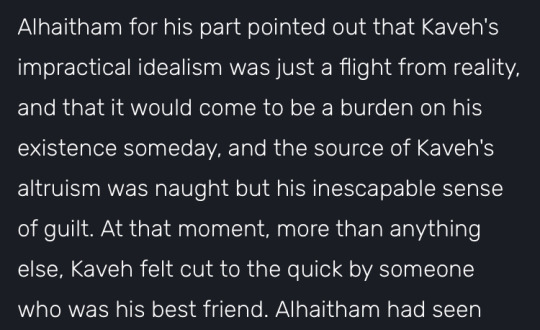
By Kaveh seeing Alhaitham’s comment about his altruism as malicious, Alhaitham has elevated himself over Kaveh, since Alhaitham does not have the same struggles as him, and has trivialised Kaveh’s trauma. To Kaveh, Alhaitham’s prioritisation of the self actively harms others as it desensitises the self to the emotions of others. Therefore, Kaveh opposes the egoism which Alhaitham advocates for, since he interprets it through his own lived experience. Hence, by Alhaitham asserting egoism over Kaveh as a means of Kaveh prioritising himself, it only reinforces Kaveh to strive to consider the feelings of others, as well as to not prioritise his own way of thinking if it undermines someone else’s.
In actuality, Alhaitham’s frustrations with Kaveh lie in his belief that Kaveh’s talents are incongruous with his values, and that if Kaveh were to prioritise himself, he would save himself suffering and enable himself to discover his “true self”, unrestricted by others placing labels onto him.
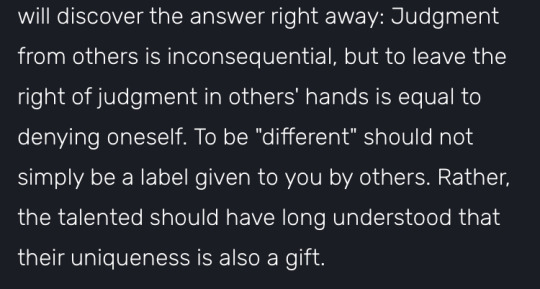
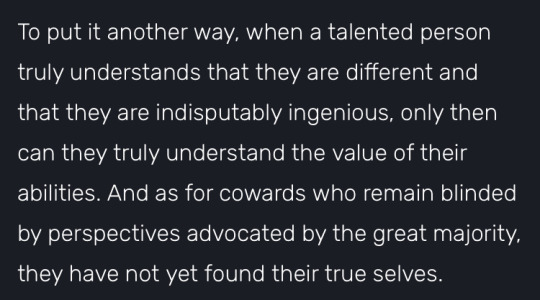
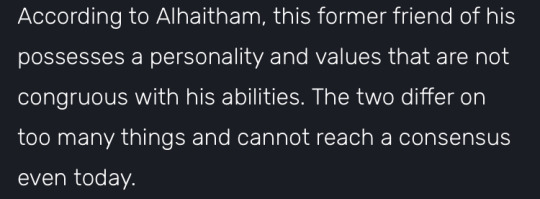

This is a personal frustration which Alhaitham would not compromise himself to assert onto a person he was indifferent to, due to his belief of not getting involved with other’s fates. However, he has been observed to ‘subvert’ his own rules to accommodate Kaveh. Through egoism, it can be seen that rather than ‘subverting’ these rules, Alhaitham adheres to them as an egoist, since he sees Kaveh as his mirror, they offer each other a contrasting perspective he believes they need to have a complete, objective vision of the world.
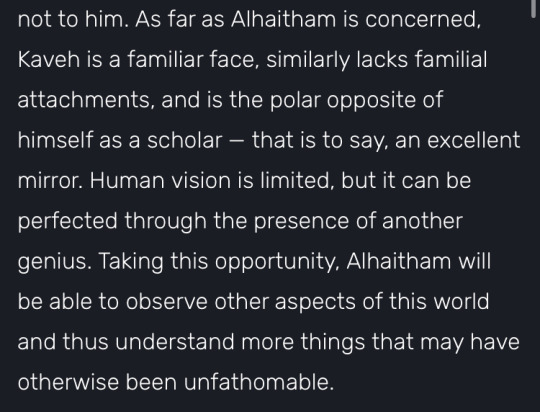
This is necessary for Alhaitham to consider within his own life, and therefore has extended his house to Kaveh, in order to expand his scope of thinking, and to consider perspectives he otherwise would not entertain. Kaveh’s ideals, his beliefs, and his philosophies explicitly interest Alhaitham, in contradiction with Kaveh believing that Alhaitham is disdainful of his perspectives.
In this way, Alhaitham enjoys Kaveh. He willingly pays for some of Kaveh’s tabs; pays for crates of wine for the two of them; and goes out of his way to pursue interactions with Kaveh. Just as Alhaitham is to Kaveh, Kaveh is an old friend, as unchanged in his beliefs as he was in the past and thus is a constant: “the most unshakable part of one's past is a friend that will never change”’.


Alhaitham strives to act in accordance to his own egoism and therefore assesses what “appears harmful” to him, in relation to these rules, so as to be rid of them. This can be extended to Kaveh, as Kaveh falls under what ‘belongs’ to Alhaitham, in the sense that ownership equates to Alhaitham’s enjoyment.
Alhaitham wants to have Kaveh in his life due to the alternate perspective which Kaveh offers him, thus expanding his horizons and granting him knowledge he otherwise would not obtain. As well as this, Kaveh is seen to be considered part of Alhaitham’s way of life that he wants to protect. In line with Stirner’s egoism, it follows that as Alhaitham enjoys Kaveh, as in, ‘owns’ the contentment Kaveh elicits, he therefore is affected by Kaveh’s self-inflicted grievances. Therefore, Alhaitham sees Kaveh’s altruism at the expense of his own wellbeing as something “harmful” to be dealt with, as this not only causes Kaveh inward misery, but also detriments Kaveh finding his “true self” (Alhaitham Character Story 3), which the egoist pursues above all else.
#i realised i hadn't actually discussed their philosophies in a post so here's an snippet from The Essay#kaveh's altruism is brushed over here but i didn't want this post getting too expansive oops#since their differences are the basis of the essay it's hard to filter that down into one post?#basically i'm aware that this reads as incomplete but i promise there is more where this came from!!!#also im reading that line: the two cannot reach a consensus even to this day#and im going insane because isn't that the resolution of their conflict? to find middle ground?#gee i wonder if that line is thematically crucial to their characters#also kaveh reads page 185 of the unique and its property and fights off a blush before denying everything#can they talk. please. im sick of them#the essay is coming along btw!!! thank you for all your thoughts and encouragement!!#haikaveh#alhaitham#kaveh#kavetham#haikaveh meta#genshin meta
135 notes
·
View notes
Note
do you have like,, any wriolette headcanons to share,, please I’m hungry,, I need wriolette food!!
Oh definitely, some of these are more wrio or neuvi specific tho but let me go off ok
Wrio has this one spot a lil far off from Meropide's entrance that he sunbathes in whenever he has the time. Its this lil cliff right here. It has a long stretch of beach, near the otter spot (TM), there's mobs to fight if he needs that, and it's not near any roads

Perfect spot for him to frostwalker/ice skate too
Neuv in one of his walks would find Wrio in his spot and Wrio would tell him this is where he goes to relax, Neuv would sometimes then use this spot too to relax in, Wrio welcomes him whenever they happen to meet here
I think Wrio never goes to the overworld until he is called in for that first meeting as Meropide's administrator, when he does step out he underestimated how much he truly missed the sunlight, the sea breeze, and the grass. It's not a big deal, he insists
Wrio would prefer sunny weather than rain, but the coldness of rain is more lively and refreshing than the cold of the fortress
Neuv can walk on water Furina style, he just chooses not to say whenever Wrio offers to skate with him. Basks in the feeling that he trusts Wrio so much to keep him from falling in
Neuvillette is a pianist while Wrio is a violinist (and does have a violin in his office) because every pairing in my book should be able to piano-violin duet the Merry-Go-Round of Life
Wrio is extremely observant, a skill he picked up from serving his sentence, it's how he's able to study and read Neuvi's tells and body language. It's very helpful whenever neuvi is too tired to talk or unable to drop the professional iudex face.
Neuvi learns by observation and attempts to pick up Wrio's tells in turn no matter how many times Wrio insists that he shouldn't worry about him <- fuck you gets loved back
Whenever they get engaged/married, their rings are simple white gold bands. Wrio replaces one of his rings with it, while Neuvi has his hooked to his cravat pin. It's so they're not too flashy and attract attention while still being with them even in work hours
Neuvi feels over the ring whenever he misses wrio
Wrio buries his face into Neuvi's neck so that he can hear Neuvi's purr of contentment better
Neuvi can get jealous but instead of cutting the convo short like Wrio does, the next time they are alone Neuvi just rubs his cheek all over Wrio's until he's happy
Wrio is touch averse, significantly more than Neuvi. While he and Neuvi had subtle touches before, getting together had pressured him to show more affection (because it doesnt bother him, he can love, so that he can be loved) Its one of the first times Neuvi was able to tell Wrio's tells correctly and to reassure him it isn't necessary and they can begin with... what they had before
They show affection primarily with holding or touching hands (ex. : holding hands when they sleep like otters, brushing knuckles and fingers when they walk, Wrio lifting neuvs hand to bury his face in it, etc.), a reassurance that the other is there with them, and they want to hold on just as much
#i love gay people!!!#i also love ghibli films#that tells you exactly how much i prefer fluff over angst#wrio honestly has the vibe of someone who forces themselves to be okay with everything hes experienced#its okay hes okay hes in control hes not broken hes mentally sane#but man when he gets what hes been missing#he feels the sun for the first time in years#he doesnt want to grasp how excrutiatingly sad and cruel how hes been denied this for so long#but it doesnt bother him. it cant. so he limits how much he allows himself to receive it#same goes for... everything else#neuv on the other hand is while he isnt emotionally inept he doesnt fully understand how human emotions work#so seeing his partner being physically and mentally withdrawn while insisting hes alright#neuv is whiplashed and confused#what is the truth? he trusts wrio right?#is it breaking his trust to cross the line and help him?#which is it#lyssten to my rambles
94 notes
·
View notes
Text
The role of Pryce and Carter's Deep Space Survival Procedure Protocol Manual in the characterisation, symbolism, and themes of Wolf 359
TL;DR: The DSSPPM is used as a tool to help establish and develop Minkowski and Eiffel as characters: Minkowski as a strict Commander who clings to the certainty provided by a rigid source of authority like the DSSPPM, and Eiffel as the anti-authority slacker who strongly objects to the idea that he ought to read the manual. The way their contrasting attitudes towards the DSSPPM manifest through the show reflect their character development and changing dynamic. The DSSPPM can be directly used against the protagonists by those with power over them, and the reveal of its authorship gives a particularly sinister edge to its regular presence in the show. But it can be also be repurposed and seen through an individual interpersonal lens.
Note: There’s plenty that you could say about the DSSPPM through the lens of what it says about Goddard Futuristics as an organisation, or about Pryce and Cutter as people. Or you could talk about Lambert quoting the DSSPPM an absurd number of times in Change of Mind, and Lovelace’s reactions to this. But in this essay, I’ll be analysing on mentions of the DSSPPM with a focus on Minkowski, Eiffel, and their dynamic.
“One of those mandatory mission training things”: the DSSPPM as a tool to establish characterisation
The first mention of Pryce and Carter's Deep Space Survival Procedure Protocol Manual (the DSSPPM) in Wolf 359 is also the very first interaction we hear Eiffel and Minkowski have. In fact, the first time we hear Minkowski's voice at all is her telling Eiffel off for not having read the manual:
[Ep1 Succulent Rat-Killing Tar]
MINKOWSKI Eiffel, did you read your copy of Pryce and Carter?
EIFFEL My copy of what?
MINKOWSKI Pryce and Carter's Deep Space Survival Procedure Protocol Manual.
EIFFEL Was that one of those mandatory mission training things?
MINKOWSKI Yes.
EIFFEL In that case, yes, I definitely did.
MINKOWSKI Did you now? Because I happened to find your copy of the D.S.S.P.P.M. floating in the observation deck.
EIFFEL Oh?
MINKOWSKI Still in its plastic wrapping.
This is an effective way to establish their conflicting personalities right out of the gate. Minkowski's determination to "do things by the book - this book in fact" contrasts clearly with Eiffel's professed ignorance about and clear disregard for "this... Jimmy Carter thing”. Purely through their attitudes to this one book, they slot easily into clear archetypes which inevitably clash. Everything about Eiffel in that opening episode sets him up as a slacker who doesn't care about authority, but the image of his mandatory mission training manual floating in the observation deck "still in its plastic wrapping" provides a particularly striking illustration.
By contrast, we immediately encounter Minkowski as a strict leader who cares deeply about making sure everything is done according to protocol; the intense importance she places on the DSSPPM is one of the very first things we know about her. Her insistence on the importance of the survival manual might seem somewhat understandable at first, if perhaps unhelpfully aggressive, but it starts to feel less sensible as soon as we start to hear some of the tips from this manual:
Deep Space Survival Tip Number Five: Remain positive at all times. Maintain a cheerful attitude even in the face of adversity. Remember: when you are smiling the whole world smiles with you, but when you're crying you're in violation of fleet-wide morale codes and should report to your superior officer for disciplinary action.
The strange, controlling, vaguely sinister tone of some of the tips we hear in the first episode is largely played for laughs, emphasised by the exaggeratedly upbeat manner in which Hera reads them. But even these first few tips give us some initial suggestions that the powers behind this mission might not care all that much about the wellbeing of their crew members.
It says something about Minkowski that she places such faith and importance in a book which says things like "Failing to remain calm, could result in your grisly, gruesome death" and "when you're crying you're in violation of fleet-wide morale codes and should report to your superior officer for disciplinary action." (Foreshadowing the Hephaestus Station as the home of immense emotional repression and compartmentalising...) Having those kind of pressures and demands placed on her (and those around her) by people above her in the military hierarchy doesn’t unsettle Minkowski.
Eiffel groans and sighs as he listens to the tips, but Minkowski seems to see this manual as an essential source of wisdom. The main role the manual plays in this episode is to establish Minkowski and Eiffel as contrasting characters with very different approaches to authority and therefore a potential to clash.
When Minkowski demands that Eiffel reads the DSSPPM, he decides to get Hera to read it to him, asking her to keep this as “a 'just the two of us, totally secret, never tell Commander Minkowski' thing”. Eiffel seems convinced that Minkowski won't be happy with him listening to Hera read the DSSPPM rather than reading it himself. This suggests that (at least in Eiffel's interpretation) Minkowski’s orders are not just about her wanting him to know the contents of the manual, since this could theoretically be accomplished just as well by him listening to it. But she wants him to do things in what she’s deemed to be the correct way, to put in the right amount of effort, and not to take what she might see as a shortcut. It’s not just about the contents of the manual; it’s about the commitment to protocol that reading it represents.
“When in doubt: whip it out”: Hilbert’s use of the DSSPPM
In Season 1, the DSSPPM isn't purely associated with Minkowski. Hilbert actually quotes it more than she does in the first few episodes. In Ep2 Little Revolución, Hilbert's response to Eiffel's toothpaste protest is inspired by "Pryce and Carter six fourteen: “When in doubt, whip it out - ‘it’ being hydrochloric acid.”" This tip is absurd in a more direct obvious way than those we heard in Ep1. While this absurdity is partly for humour, it also casts further doubt on the usefulness of this supposedly authoritative survival manual, and therefore on the wisdom of trusting Command.
In Ep4 Cataracts and Hurricanoes, Hilbert starts to quote Tip #4 at Eiffel, who protests "I'm not gonna have one of the last things I hear be some crap from the survival manual". These moments again place Eiffel in clear opposition to the DSSPPM, but also suggest that Hilbert's attitude towards the DSSPPM - and therefore towards Command - is closer to Minkowski's than to Eiffel's.
When Hilbert turns on the Hephaestus crew in his Christmas mutiny, his allegiance to Command is revealed as dangerous. And here the DSSPPM comes up again. As Minkowski dissolves the door between her and Hilbert, she triumphantly echoes his own words back to him: "Pryce and Carter six fourteen: “When in doubt, whip it out - ‘it’ being hydrochloric acid.” Never. Fails." This provides a callback to a previous, more comedic conflict on the Hephaestus, and reminds the listener of a time when Minkowski and Hilbert were working together against Eiffel, in contrast to the current situation of Minkowski and Eiffel versus Hilbert. But it also shows that Minkowski, like Hilbert, is capable of using some of the more absurd DSSPPM tips to defeat an adversary. And it shows Minkowski leaning on those tips in a real moment of crisis.
Once Hilbert has betrayed the crew in order to follow orders from Command, we might look back on his quoting of the DSSPPM as casting the manual in a more sinister light, and again calling into question the wisdom of Minkowski placing such trust in it.
“It's not that I don't believe it, I'm just disgusted by it”: the DSSPPM as an indicator of a changing dynamic
The next mention of the DSSPPM is in Ep17 Bach to the Future:
MINKOWSKI Eiffel's been spot-testing me, Hera. He doesn't believe that I've memorized all of the survival tips in Pryce and Carter.
EIFFEL It's not that I don't believe it, I'm just disgusted by it. I keep hoping to discover it's not true.
MINKOWSKI Well, believe as little as you want, doesn't change the fact that I do know them. And so should you!
I think this provides an interesting illustration of the way in which Minkowski and Eiffel’s dynamic has developed since Ep1. They still have deeply contrasting attitudes to the DSSPPM, but this contrast is now a source of entertainment between them, rather than merely of conflict.
Given that Hera wasn’t aware of Eiffel testing Minkowski on the tips, we can guess that it’s a game they came up with while Hera was offline. In the midst of all the exhaustion and uncertainty and fear they were dealing with after Hilbert’s mutiny, this was a way they found to pass the time. It must have been Eiffel who suggested it; Minkowski cites his disbelief as the reason for the spot-testing. And yet she plays along, responding each time, even though this activity has no real productive value.
Minkowski is keen to demonstrate that she does know the tips and she emphasises that Eiffel ought to know them too, but their interactions about the DSSPPM in this episode have none of the genuine irritation and frustration that they displayed in Ep1. It feels almost playful and teasing. Eiffel still thinks Minkowski is "completely insane" for learning all the tips and is "disgusted" by her commitment to memorising them, but these comments feel much closer to joking about a friend's weird traits than to insulting a hated coworker's personality. It feels like something has shifted since Eiffel responded to Minkowski’s passion for the DSSPPM by saying “I'm so glad that your shrivelled husk of a dictator's heart is as warm as a decompression chamber”.
Another thing to note here is that Minkowski's respect for the DSSPPM has clearly survived Hilbert's Christmas mutiny and Minkowski's resulting distrust of Command. From Hilbert's behaviour at Christmas, it's clear that the crew's survival is not at the top of Command's priority list. But Minkowski still trusts the book that Command told her to read. She still thinks Eiffel should read it too. The main figures of authority above her are dangerous and untrustworthy, but she still clings to the source of guidance they provided her with.
It's also worth noting that Minkowski has not just learnt the advice in each of the 1001 tips, but she has memorised (nearly) all of them by number. If it was just about the information that the manual provides to inform responses to potentially life-or-death situations, then knowing the numbers wouldn't be necessary. Nor would it be particularly useful to know them all exactly word-for-word. Minkowski's reliance on the DSSPPM is again suggested to be about more than the potential practical use of its content. It's about showing that she is committed and disciplined and up to the task of leading. She does have some awareness of the strangeness of many of the tips, but this doesn't diminish the value of her adherence to the manual for her:
EIFFEL You're insane.
MINKOWSKI I'm disciplined. Although I will admit they do get more... esoteric as you go higher up the list.
There's only one tip Minkowski doesn't seem to remember, and that's revealing too:
EIFFEL 555?
Minkowski DRAWS BREATH - and STOPS SHORT. [...]
MINKOWSKI Hold on a second, I know this. (beat) Dammit.
EIFFEL Hey, look at that! Looks like there may be hope for you yet.
MINKOWSKI Quiet, Eiffel. Hera, what's D.S.S.P.P.M. 555?
HERA "Good communication habits are key to continued subsistence. Be in touch with other crew members about shipboard activities. Interfacing about possible problems or dangers is the best way to anticipate and prevent them."
This hangs in the air for a second. Then –
EIFFEL So you forget the one tip in the entire manual that's actually helpful?
MINKOWSKI Shut up.
Communication is a key theme of this show, so it’s interesting that this is the one tip Minkowski can’t remember, perhaps indicating an aspect of leadership and teamwork that she doesn’t always prioritise or find easy.
Eiffel saying “Looks like there may be hope for you yet” seems like just a throwaway teasing line, but it’s got a profound edge to it. A lot of Minkowski’s arc is about learning how to provide her own direction and support her crew outside of the systems of authority and hierarchy that she’s grown so attached to. So perhaps Eiffel is right to see a kind of hope in her failure to remember every single DSSPPM tip – she has the potential to break free of her reliance on external authority.
“Which one was 897, what was the exact phrasing of that Deep Space Survival Tip?”: the DSSPPM in interactions with Cutter
The Wolf 359 liveshow, Deep Space Survival Procedure and Protocol, is literally named after the manual. This suggests, before we’ve even heard/watched the episode, that the DSSPPM will be a key symbol here. Which is interesting because I'd say the liveshow has two main plot points: (a) Eiffel's failure to read the DSSPPM or follow orders in general, the resulting disruption to the mission, and his crewmates' frustration with this; and (b) the looming threat of Cutter, the necessity of keeping information from Command, and the risk of fatal mission termination.
Even without the knowledge that Cutter is one of the co-authors of the DSSPPM (which neither the Hephaestus crew nor a first-time listener knows at this point), there's a kind of irony in the contrast between these two plotlines. On the one hand, Minkowski repeatedly berates Eiffel for not having read Pryce and Carter's Deep Space Survival Procedure and Protocol Manual, which was made mandatory by Command. On the other hand, she is aware that Command in general - and Cutter specifically - represents the biggest threat to the safety and survival of her crew.
Cutter uses the DSSPPM against each of the Hephaestus crew in their one-on-one conversations with him. For Minkowski, he uses it as a way of emphasising the expectations and responsibility placed on her:
MINKOWSKI There are always gaps between expectation and reality, but--
CUTTER But it's our job as leaders to close that gap, isn't it? Pryce and Carter...?
MINKOWSKI 414, yes. Yes, sir, I know.
Cutter knows that Minkowski will know those tips and he knows abiding by them is important to her. She's quick to demonstrate her knowledge of the DSSPPM and agree with the tip. There's something deeply sinister to me about Cutter's use of the word 'our' here. His phrasing includes them both as leaders who should be ensuring that things are exactly as expected. It’s almost a kind of flattery at her authority, but it comes with impossibly high expectations. This way of emphasising the importance and responsibilities of her role as Commander is a targeted strategy by Cutter at manipulating Minkowski, designed to appeal to her values.
In Hera's one-on-one, Cutter uses a DSSPPM tip to interpret her behaviour and claim that he can read her motives:
CUTTER This thing you're doing. Asking questions while you get your bearings.
HERA Sir, I'm just curious about--
CUTTER Pryce and Carter 588: Shows of courtesy and polite queries are an efficient way to gain time necessary to strategize.
Unlike with Minkowski (or Eiffel), Cutter doesn't prompt Hera to demonstrate her knowledge of the manual. That wouldn't work as a power play against Hera, who would be able to recall the manual (or, rather, retrieve the file, however that distinction works within her memory) but who doesn't care about the DSSPPM like Minkowski does. Instead, Cutter implies that Hera’s behaviour can be predicted - or at the very least seen through - by the DSSPPM, which seems like a cruel attempt by Cutter at belittling her.
For Eiffel, Cutter uses the manual as a weapon in a different way again. He asks Eiffel, "which one was 897, what was the exact phrasing of that Deep Space Survival Tip?", something which Eiffel clearly doesn't know, but Cutter of course does. This puts Eiffel on the back foot, trying to defend and justify himself, allowing Cutter to emphasise his position of power yet again.
The DSSPPM plays a double role in the liveshow. On the one hand, as Minkowski reminds Eiffel, proper knowledge of the manual "would've saved [the crew] from these problems with the nav computer" – some of the tips can potentially save the crew a great deal of hassle, stress, and risk. On the other hand, the same manual is used by Cutter to manipulate, unsettle, and intimidate the crew. There are these two sides to the information given to the crew by Command - two sides to the manual which Minkowski still values.
In another duality for the DSSPM, the manual is sometimes used as a symbol of the relationship between the crew members and Command, and sometimes used to indicate the dynamics between the individual crew members, usually Minkowski and Eiffel. Before Cutter’s appearance in the liveshow, Minkowski and Eiffel’s discussions of the DSSPPM reflect interpersonal disagreements between two people with fundamentally different attitudes:
MINKOWSKI Oh come on, why do you think I keep trying to get you to go over these things? Do you think I enjoy going through them?
EIFFEL Yes.
MINKOWSKI Well, alright, I do. But this knowledge could save your life.
Minkowski enjoys rules, regulations, and certainty, for their own sake as much as for any practical usefulness. Eiffel very much does not. This is a simple clash of individuals, in which the link between the DSSPPM and Command is implicit. Minkowski doesn't seem to question the idea that the information in the DSSPPM is potentially life-saving, even though she knows Command don't care about their lives. But Cutter’s repeated references to the DSSPPM remind us who made that book a mandatory part of mission training – it certainly wasn’t Minkowski, even if she’s often the one attempting to enforce this rule.
At the end of the liveshow, in a desperate attempt to prevent mission termination, Eiffel promises Cutter that he will read the DSSPPM (the liveshow transcript notes that him saying this is "like pulling teeth"), an instance of the manual being used in negotiations between the Hephaestus crew and Command. All Minkowski’s orders weren’t enough to get Eiffel to read that book, but a genuine life-or-death threat might just about be enough. Perhaps it's ironic that Eiffel reads the survival manual out of a desire for survival, not because he thinks the contents of the book will help him survive, but because he’s grasping anything he can offer to buy the crew’s survival from those who created that same book.
In the final scene of the liveshow, Minkowski catches Eiffel reading the DSSPPM, and he fumbles to hide that he's been reading it, a humorous reversal of all the times that he's lied to her that he has read it. Perhaps admitting that he's reading it would be like letting Minkowski win. Minkowski seems to find both surprise and amusement in seeing Eiffel finally reading the manual, but she doesn't push him to admit it. There's some slightly smug but still friendly teasing in the way Minkowski says "were you now?" when Eiffel says that he was just reading something useful. In that final scene, the manual is viewed again through the lens of Minkowski and Eiffel’s dynamic – Command’s relation to the DSSPPM becomes secondary.
“The first thing I'd make damn sure was hard wired into anything that might end up in a situation like this one”: the DSSPPM as a tool of survival
In Ep30 Mayday, when Eiffel is stranded alone on Lovelace’s shuttle, he hallucinates Minkowski to bring him out of his helpless panic and force him into action. And this hallucination also brings with it one of Minkowski’s interests:
MINKOWSKI Eiffel... I worked on this shuttle. Reprogramming that console.
EIFFEL So? How does that help –
MINKOWSKI Think about it.
BEAT. And then he gets it.
EIFFEL Oh goddammit.
MINKOWSKI What's the first thing that I would do when programming a flight computer? The first thing I'd make damn sure was hard wired into anything that might end up in a situation like this one?
EIFFEL Pyrce and Carter's Deep Space Survival Procedure and Protocol Manual.
Again, a conversation about the DSSPPM gives us an indication of the development of Minkowski and Eiffel’s relationship. Not only does Eiffel imagine Minkowski as a figure of (fairly aggressive) support when he’s stranded and alone, he thinks about what advice she’d give him and he follows it. Rather than dismissing the manual entirely, he looks for tips that are relevant to his situation. He’s not pleased about his hallucinated-Minkowski trying to get him to read the DSSPPM, but that was what his mind gave him in an almost hopeless situation. Some part of him now empathises with Minkowski’s priorities in a way that he definitely wasn’t doing in Ep1. He thinks that the DSSPPM might be on the shuttle because he knows the manual is important to Minkowski. It’s by imagining Minkowski that he gets himself to read the manual in order to see if it can help him survive – he certainly doesn’t think about what Cutter or anyone else from Command would tell him to do.
In the end, the tips Eiffel picks out aren’t all that helpful or informative: “Confront reality head-on”; “In an emergency, take stock of the tools at your disposal. Then take stock again. Restock. Repurpose. Reuse. Recycle."; and “"In times of trouble, an idle mind is your worst enemy”. But Eiffel does use these tips to structure his initial thinking about how to survive on Lovelace’s shuttle. In an almost entirely hopeless situation, Eiffel finds some value in the DSSPPM. But since the tips he picks out are mostly platitudes, the actual wisdom that allows him to survive all comes from his own mind; the tips, like his hallucinations, are just a tool he uses to externalise his process of figuring out what to do.
“Wasn't there something about this in the survival manual?”: Minkowski potentially moving away from the DSSPPM
Given the significance of the DSSPPM in Season 1 and 2 to Minkowski in particular, it feels notable when the manual isn’t referenced. Unless I've missed something (and please let me know if I have), Minkowski – the real one, not Eiffel’s hallucination - doesn't bring up the manual of her own accord at all in Seasons 3 or 4. This might make us wonder if she’s moved away from her trust in and reliance on that book provided by Command.
Perhaps the arrival of the SI-5, which highlights to Minkowski that the chain of command is not a good indicator of trustworthy authority, was the final straw. Or perhaps the apparent loss of Eiffel - and any subsequent questioning of her leadership approach, or realisations about the valuable perspective Eiffel provided - were what finally broke down her faith in that book.
Alternatively, perhaps Minkowski still trusts the DSSPPM as much as ever, but trying to get Eiffel or any of the other crew members to listen to it is a losing battle that she no longer sees as a priority. Either way, Minkowski’s apparent reluctance to bring up the DSSPPM feels like a shift in her approach.
The associations between Minkowski and the DSSPPM are still there in Season 3, but they are raised by other characters, not by Minkowski herself. The manual is used to emphasise Eiffel’s difficulties when he’s put in charge of trying to get Maxwell and Hera to fill out a survey in Ep32 Controlled Demolition. Trying to force other people to be productive pushes Eiffel into some very uncharacteristic behaviour:
EIFFEL Jesus Christ, what is wrong with you? It's like you've never even read Pryce and Carter! Tip #490 very clearly states that –
He trails off. After a BEAT –
HERA Officer Eiffel?
MAXWELL You, uh, all right there?
EIFFEL (the horror) What have I become?
[...]
Eiffel, now wrapped up in a blanket, is next to Lovelace. He is still very clearly shaken.
EIFFEL ... and... it was like an episode of the Twilight Zone. I was slowly transforming into Commander Minkowski. [...] It was a nightmare! A terrifying, bureaucratic nightmare!
This is a funny role reversal, but it shows us the strength of Eiffel’s association between Minkowski and the DSSPPM, as well his extreme aversion to finding himself in a strict bureaucratic leadership position. It also suggests that becoming extremely frustrated when trying to get other people to do what you want might make anyone resort to relying on an external source of authority, such as the manual. I don’t know whether this experience helps Eiffel empathise with Minkowski, but perhaps it might give us some insight into how her need for authority and control in the leadership role she occupied might have reinforced her deference to the DSSPPM.
In Ep34, we get a suggestion of another character having a strong association between the DSSPPM and Minkowski. After the discovery of Funzo, Hera asks Minkowski what the manual says about it:
HERA Umm... I don't know if this is a good idea. Lieutenant, wasn't there something about this in the survival manual?
MINKOWSKI Pryce and Carter 792: Of all the dangers that you will face in the void of space, nothing compares to the existential terror that is Funzo.
It’s interesting to me that Hera asks Minkowski here. We know from Ep1 that “Pryce and Carter's Deep Space Survival Procedure Protocol Manual is among the files [Hera has] access to”. Two possible reasons occur to me for why Hera might ask Minkowski about the DSSPPM tip here. One possibility is that Hera thinks that retrieving the manual from her databanks and finding the correct tip would take her more time than it would take for Minkowski to just remember the tip. Which suggests interesting things about the nature of Hera’s memory, but also implies that - at least in Hera's view -Minkowski’s knowledge of the DSSPPM is more reliable than that of a supercomputer.
The other possibility is that Hera could have recalled the relevant DSSPPM tip incredibly quickly but she doesn’t want to, maybe because she resents having that manual in her head in the first place, or maybe because she wants to show respect for Minkowski’s knowledge as a Commander. Either way, we can see that Hera – like Eiffel – strongly associates Minkowski with the DSSPPM.
And Minkowski, even if she wasn’t the one to bring up the manual here, recalls the relevant tip immediately. Perhaps she is moving away from her trust in that manual, but everything that she learned as part of her old deference to the authority of Command is still there in her head. She might want to forget it by the end of the mission, but that’s not easily achieved. The way Minkowski’s friends/crewmates associate the manual with her emphasises the difficulty she’ll face if she tries to move away from it.
“One thousand and one pains in my ass”: The authorship of the DSSPPM
In Ep55 A Place for Everything, Eiffel effectively expresses his long-held dislike of the DSSPPM when he comes face-to-face with both of its authors:
EIFFEL What? What the hell are - wait a minute - Pryce? As in one thousand and one pains in my ass, Pryce? (sudden realization) Which... makes you...?
MR. CUTTER (holding out his hand) W.S. Carter, pleased to meet you.
It’s significant that the two ‘big bads’ of the whole series are the authors of the manual which Minkowski and Eiffel were bickering about all the way back in Ep1. It’s not the only way in which the message of this show positions itself firmly against just accepting externally imposed authority and hierarchy without question or evidence, but it does reinforce this ethos.
By being the authors of the manual, Cutter and Pryce have had a sinister hidden presence throughout the show. Long before we know who Pryce is and even before we hear Cutter’s name, their manual is there, occupying a prominent place in Minkowski’s motivations and priorities, and in her arguments with Eiffel. It’s not at all comparable to what Pryce put in Hera’s mind, but it is another way in which these antagonists have wormed their way into the heads of our protagonists.
Minkowski will have to come to terms with the fact that the 1001 tips she spent hours memorising and reciting were written by two people who would have killed her, her crew, and even the whole human race without hesitation if it served their purposes. We never get to hear Minkowski’s reaction to learning the identities of Pryce and Carter, but I think processing the role of their manual in her life will be a long and difficult road that’ll tie into a lot of other emotional processing she needs to do. Her assertion to Cutter that, without him, she is “Renée Minkowski... and that is more than enough to kick your ass!” feels like part of that journey. She doesn’t mention the DSSPPM at all in Season 4. She’s growing beyond it.
"Doug Eiffel's Deep Space Survival Guide": The DSSPPM as a weapon against those who wrote it
Last but not least, I couldn’t write about Eiffel and the DSSPPM without mentioning this scene from Ep58 Quiet, Please:
EIFFEL As someone once told me: "Pryce and Carter 754: In an emergency, take stock of the tools at your disposal, then take stock again. Repurpose, reuse, recycle." And right now? You know what I got? I got this lighter from when Cutter was using me as his personal cabana boy. [...] and I've got myself this big, fat copy of the Deep Space Survival Manual, and you know what I'm gonna do with it? [...]
Eiffel STRIKES THE LIGHTER. And LIGHTS THE BOOK ON FIRE, revealing Pryce just a few feet away from him!
EIFFEL I am going to repurpose it... and reuse it... and recycle it into a GIANT FIREBALL OF DEATH!
And he swings the flaming book forward, HITTING PRYCE ON THE SIDE OF THE HEAD. [...]
EIFFEL That's right! Doug Eiffel's Deep Space Survival Guide, B-
No one other than Doug Eiffel could pull off the chaotic energy of this moment. It doesn’t get much more anti-authority than lighting the mandatory mission manual on fire and using it as a weapon against one of its malevolent authors. It might not be the wisest move safety-wise, and it certainly doesn’t improve the situation when the node gets jettisoned into space. But there is still a powerful symbolism in taking a symbol of the hierarchical forces that have tried to constrain you for years and setting it alight to fight back against those forces. Eiffel takes his own approach to survival and puts his own name into the title, an assertion of his agency and rejection of Command's authority.
The DSSPPM tip that he uses here is one of those he considers when stranded on Lovelace’s shuttle. It’s understandable that after that experience it might have stuck in his memory.
I can’t help feeling that the line “as someone once told me” has a double meaning here. The immediate implication is to interpret “someone” as being Pryce and Cutter – it’s their manual after all – which makes this line a fairly effective ‘fuck you’ gesture, emphasising how Eiffel is using Pryce’s manual against her in both an abstract and a physical sense.
But I think “someone” could also mean Minkowski. Eiffel uses a singular rather than plural term, there’s already an association established between Minkowski and the DSSPPM, and, in Mayday, it’s his hallucination of Minkowski that gets him to read this tip. She's probably also recited this tip to him at other points as well. Under this interpretation, this line is as much a gesture of solidarity with Minkowski as it is a taunt to Pryce. I like the idea that these two interpretations can run alongside each other, reflecting the duality of the use of the DSSPPM that I talked about in relation to the liveshow.
Conclusion
The DSSPPM is a symbol of external rules imposed on people by those with power over them. These rules can be strange, arbitrary, and even sinister, but for those with a desire for certainty and control, like Minkowski, they can be tempting. And they can have their uses, as well as the potential to be repurposed. Attitudes towards these rules provide an effective shorthand as part of Minkowski and Eiffel’s characterisation. And the clash between these attitudes, and how that clash manifests, can tell us something about how the dynamic between those characters develops and changes.
#Wolf 359#w359#Renee Minkowski#Doug Eiffel#Renée Minkowski#I guess I lied when I said I was halfway through at 1000 words#I hope that those who liked my preview post were up for a long read#This is over 5000 words and I still haven't said everything!#You could write a PhD thesis on this#Honestly I feel like this is full of typos and mistakes cos I was kinda tired as I proofread it but I just want to get it posted today#Otherwise I could spend even more time on it and make it even longer... (and also I want it to be out in the world)#But please do lmk if you spot a typo/mistake. I won't be offended#I'd also be interested to hear people's thoughts on any of this#Unimportant point but I'm shaking my head at Minkowski if she wouldn't let Eiffel listen to the DSSPPM instead of reading it#Audiobooks are a valid method of reading. Don't deny a man with ADHD his own approach to absorbing info!#Then again. it might have been an unfounded assumption of Eiffel's that Minkowski wouldn't have accepted him listening to it#I think in school he definitely got in trouble for boasting that he's actually read the book this time when he just watched the film#the empty man posteth
152 notes
·
View notes
Text
Ok listen, Gwen being killed off would be interesting because the rest of the OIAR would have to grapple with the grief and the underlying feeling of suspicion in the way she died. Like she'd be a warning that would be ignored and I think it would switch up the dynamics in a really cool way.
#alice would be wildly conflicted with grief and probably unable to handle it#sam has probably dealt with grief before so is a bit calmer#but also conflicted cause he didnt know her for that long#celia has no fucking idea how to act cause everyones suddenly changed demeanor and she didnt even know gwen#so like if she acts sad they'll think its not genuine#but itll be weird if she acts like everythings normal as well#lena would be like offering alice a mental health leave which she would firmly deny#colin would probably spiral deeper into his madness#but maybe also get closer to sam in the process#while this splits sam and alice#cause Sam's going deeper down the rabbit hole#and alice is intent in burying her head in the sand#tmagp#the magnus protocol#tmagp theories#gwen bouchard#alice dyer#sam khalid#lena kelley#celia ripley#colin becher
64 notes
·
View notes
Text
It absolutely means EVERYTHING that the battle theme is named after one of Susie's abilities
#Susie is the main character of Deltarune#People are so caught up in the meta-narrative of the Player and Kris but Susie is the centerpoint of everything#I subscribe to the theory that Susie would be the final boss of the weird route because that sounds SO compelling#But seriously think about it#Undertale had characters who tried to break out of the confines of the narrative with Undyne- especially in Geno- and with Flowey/Asriel#And Deltarune has the same with Kris and Spamton and Noelle and you get the point#But SUSIE is the only one that succeeds. She doesn't listen to us in Chapter 1. She defies the prophecy and goes out on her own#She denies us the chance to see her and Noelle interact in the Weird Route#She and she alone acknowledges all the fourth-wall breaks and how weird they are#Because Noelle does comment on them but she just assumes it's natural- she says the Dark World combat is like Dragon Blazers#And she doesn't go further than that in questioning unless forced to via Snowgrave#Susie is the center of it all.#Susie Deltarune#Deltarune#UTDR
39 notes
·
View notes